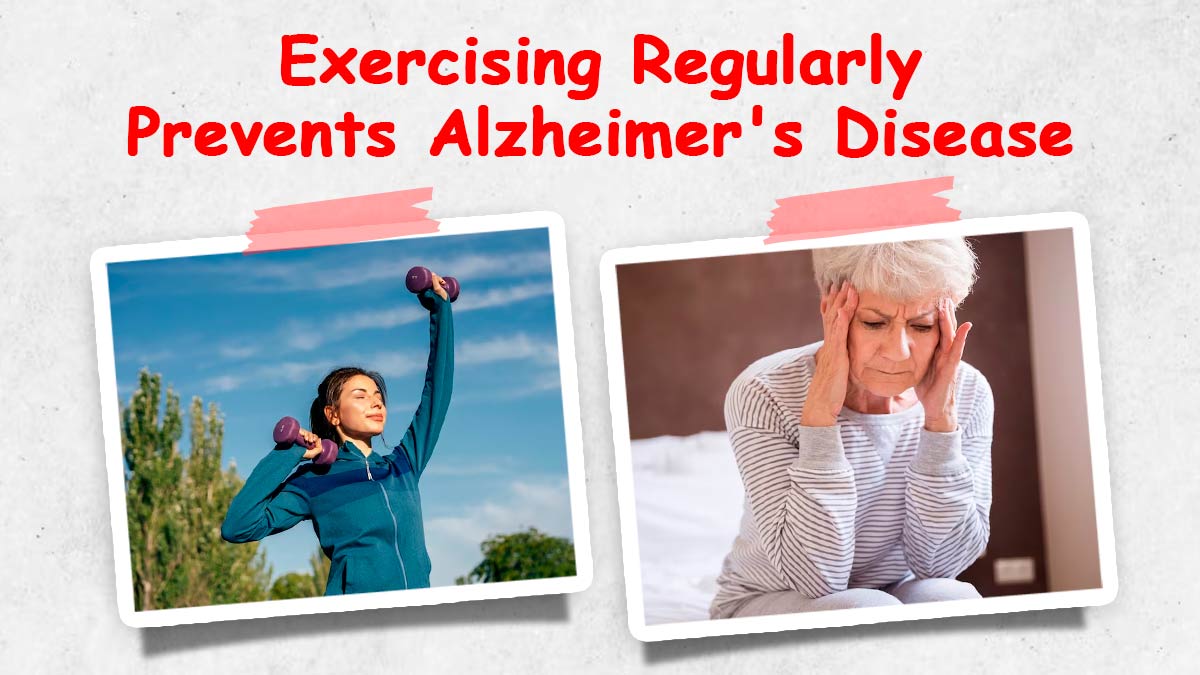
Alzheimer's Disease (AD) is a viciously progressing illness that can leave our aged population without their own memories. Horrifying and brutal are small words for this neurodegenerative condition, which currently has no known cause or cure. However, recent studies have provided a ray of hope in the form of a curious link between regular exercising and reduced risk of Alzheimer’s. Published in the online journal Neuron, the study conducted by researchers from Harvard Medical School informed that exercising triggers Irisin, a hormone that aids in slowing the progression of Alzheimer’s Disease.
Table of Content:-
Exercise Can Help Alzheimer's Disease

Irisin is like a little clean-up crew in the brain. It helps get rid of the troublesome amyloid protein the build up of which is a major risk factor for Alzheimer's. So, more Irisin activity means less amyloid hanging around to cause unnecessary havoc. The researchers shared that the exact way in which exercising makes Irisin more active is still a mystery that scientists are trying to solve. However, they made a few conjectures in their study, beyond the clean-up of amyloid protein, that could explain this link:
- Brain Health: Irisin has often shown a tendency to have protective effects on brain cells. It helps improve the structure and function of the brain, reducing the risk of cognitive decline.
- Anti-Inflammatory Properties: Irisin has anti-inflammatory properties that combat chronic inflammation in the brain which is a key contributor to Alzheimer's Disease.
- Neuroprotection: Irisin also stimulates the production of a protein that supports the growth and maintenance of neurons. Higher levels of this protein mean better cognitive function and a reduced risk of Alzheimer's.
The Right Way To Exercise To Prevent Alzheimer’s Disease

Now that you are aware of this curious connection between exercising and Alzheimer’s Disease, here are a few pointers to help you indulge in physical training the right way:
- Aerobic Activities: Aim for at least 150 minutes of moderate-intensity aerobic exercise per week. This includes activities like brisk walking, cycling, swimming, dancing, or any other stamina-building exercises or sports.
- Strength Training: Don't forget to include strength training exercises to complement your aerobic workouts. Building muscle also contributes to Irisin production.
- Consistency is Key: Make exercise a regular part of your routine. Indulging in a high-intensity workout once in a while is not going to be of much help. Even small workouts can have a cumulative effect on Irisin levels and brain health, only if you practice them regularly.
- Variety: Mix up your exercise routine to keep things interesting and challenging for your body. Try different activities and workouts to engage various muscle groups of your body.
While exercising and Irisin play a crucial role in Alzheimer's prevention, you need to adopt a holistic approach to brain health. Consume a balanced diet rich in antioxidants, omega-3 fatty acids, and brain-boosting nutrients, engage in activities that challenge your brain, such as puzzles, reading, or learning a new skill, Prioritise good sleep hygiene to support brain health and memory consolidation, and practice stress-reduction techniques like meditation or yoga. Only a holistic approach can delay the progression of Alzheimer’s and even save you from other morbidities.
Read Next
World Alzheimer’s Day 2023: 7 Common Questions About Alzheimer’s Disease Answered By Neurologist
How we keep this article up to date:
We work with experts and keep a close eye on the latest in health and wellness. Whenever there is a new research or helpful information, we update our articles with accurate and useful advice.
Current Version